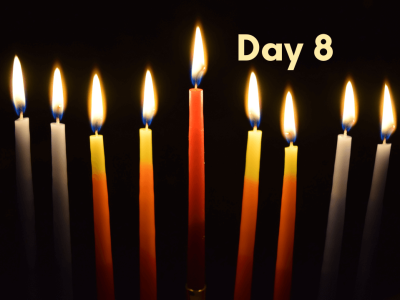Elul-Time to Prepare
Elul-Time to Prepare
When a bride and groom have planned a wedding day, do they just show up on the day or do they spend months planning out every last detail? When you are scheduled to go on vacation on May 1st, do you wait until the morning of to purchase your airline tickets and make reservations for your family? I hope not. In the same way, if you knew that the Messiah was coming back 30 days from now, would you not make final preparations before leaving this earth? This is what the month of Elul, the sixth month on the Hebrew calendar, is all about. Elul is like the “John the Baptist” forerunner month before the coming of the Messiah during the Fall Feast days.

As humans, and especially as American believers, we love to procrastinate. We love to do things last minute and in general, we tend to leave the things we need to do the most until last. But in a Hebrew culture, preparing and thinking ahead is part of everyday life. In an agricultural culture of 2000 years ago, there was a major process to go through just to make and enjoy bread or a meal. Everything took longer and everything had to be carefully planned out and prepared for.
Unfortunately, because of our fast-paced society, we don’t really have to think about preparing for things as much as they did long ago. This has carried over into our spiritual lives where we are always looking for quick fixes, fast food answers, and microwave power. The truth is that our souls are the ground the Spirit uses to plant His Truth and that ground has to first be prepared, broken up, and softened before the seeds of His word can actually take root. The month of Elul is that time of the year when believers everywhere begin to prepare the soul of their souls and start to look within to solve the problems of their lives.
“Judge not, that you be not judged. For with what judgment you judge, you will be judged. And with the measure you use, it will be measured back to you. And why do you look at the speck in your brother’s eye, but do not consider the plank in your own eye? Or how can you say to your brother, ‘Let me remove the speck from your eye,’ and look, a plank is in your own eye? Hypocrite! First remove the plank from your own eye, and then you will see clearly to remove the speck from your brother’s eye.” — Matthew 7:1
Elul is a time for looking into the mirror of God’s Word and removing the things that are in our own eyes that are causing us to not see clearly. When we see clearly, we can help others see clearly. Elul is all about preparing our eyes to see straight. Let’s take a look at the word “prepare.”
The main Hebrew word for “prepare” is “koon,” spelled kaf, vav, nun. The ancient pictograph of the word is quite striking. The kaf was a bent hand, like the hand that is placed on the back of the head to anoint someone, and meant “to anoint or bless.” The vav was a peg or a nail and meant “to connect, bridge or firmly establish something.” Nun was a picture of a seed breaking through the ground and means “life, to bring life, or to break through to life.” When you put all of that together, the original meaning of “koon” (prepare) is, “The anointed hand will always connect you to life.” To prepare is to get connected to that which brings life. Koon is to bring a solid connection to life. What does a pastor do? What does a teacher do? What did Yeshua do? They all are commissioned and anointed for one purpose: to connect His people to life. And Yeshua IS the way, the truth and the life!
When we look into the scriptural definition of prepare we come out with a very rich understanding that is a bit different than our western definition. Let’s go to the book of Judges at the end of Samson’s life and we will get the true meaning of this amazing word.
“Then Samson said to the lad who held him by the hand, ‘Let me feel the pillars which support the temple, so that I can lean on them.'” — Judges 16:26
At first glance, we see no word “prepare” in this verse. But the English word “support” here is actually the Hebrew word “koon.” Another version says, “Let me feel the pillars on which the entire temple is firmly established…” The word “established” is koon. The word koon does not mean “to get some ingredients together, make a list, or start thinking about your plans” like it does in English. Hebrew is a concrete language, a language of action that has a final point and conclusion as its agenda. In Hebrew, “koon” means “To firmly establish, to be readied, be certain, be prepared or be fixed and unchanging.”
In the example from Judges, the pillars were “preparing” the temple to be used for a purpose. They were establishing it. To prepare and to establish do not seem to be connected ideas in English, but in Hebrew, they are the exact same concept. The entire purpose of preparing something is to establish it. They are one and the same in the Hebrew mind and cannot be separated. Like belief and obedience or faith and works. One proves the other. They are not separate. They are echad (one), two components that make up the whole. One simply cannot exist without the other in its entirety.
When God prepares someone, it doesn’t always look the way we expect it to. In the western mindset, we look at preparation as going to school, reading books, and learning everything we need to learn in order to do what we are planning to do. This is how our entire modern scholastic system works. But in the ancient world, to prepare was to be an apprentice. It was to DO while you learned.
In the same vein, the way Yahweh chooses to prepare someone most often is through trials and tribulations. It is through the prison experience that I became the most prepared to do what He has called me to do. The trials in our lives are what God uses to actually train us, prepare us, and “establish” us in our future. It is the storms of life that cause a tree to become strong and the roots to grow deep. Trials and prison experiences may not look like preparation, but it is during those times that the “pillars” of the Temple are created. Trials make us stronger because we are learning to depend on Him. When we are not going through trials, we are leaning on our own understanding and our own strength. When we are put into dungeons, persecuted, slandered, and go through extreme tribulation, THIS is when He becomes fully formed in us, and in our weakness and giving up, He becomes strong. It is at this point that we become established.
Let’s turn to Genesis to further this idea.
“And the dream was repeated to Pharaoh twice because the thing is established (koon) by God, and God will shortly bring it to pass.” — Genesis 41:32
The dream was the preparation for the reality to come to pass.
“The LORD reigns, He is clothed with majesty. The LORD is clothed, He has girded Himself with strength, surely the world is established, so that it cannot be moved. Your throne is established from of old and You are from everlasting.”– Psalms 93:1
The Word is “koon.” It is established, fixed, and prepared for us. As a matter of fact, in English, we actually have an idiom that connects us to this ancient definition of firmly establishing. When we say, “Are you fixing dinner?” we are actually talking about preparing dinner. We don’t actually mean that dinner is broken and needs fixing, but rather that dinner is being established and being made into a fixed position.
So how does all this relate to Preparing for the Fall Feasts in the month of Elul? Kaf, vav, nun. The anointed hand that connects us to Life. The Way, The Truth, and The Life is coming soon to a planet near you and we are commanded to be prepared. Now is the time and today is the day to look deep within and ask ourselves, “Father, what do you want me to learn through this trial? What can “I” change in MY life? What can I learn from this situation that would help establish you more firmly in my life?” When we get to that point where we stop pointing fingers and trying to get everyone else to repent and start looking at our own lives and how we have fallen short of His glory, we all will begin to see more clearly. We will be more established. When we truly understand that trials, tribulation, and difficulty are designed to get us to a place where we trust less in ourselves, surrender our wills, and fully trust Him, then, and only then, will we be fully prepared (established) in Him.
I encourage each of you to begin this day by looking in the spiritual mirror and allowing the Spirit to reveal to you the parts of your life that need to change and then focus on them with all your heart. Don’t take up any more energy trying to get others to repent if they aren’t listening anyway. Leave the judging to the Big Guy upstairs and admit in your weakness that you can’t make it without Him. Then trust Him in your weakness and remember that your entire life is just preparation for eternity. You’re not playing for here. You’re interviewing for there!
Jim Staley












